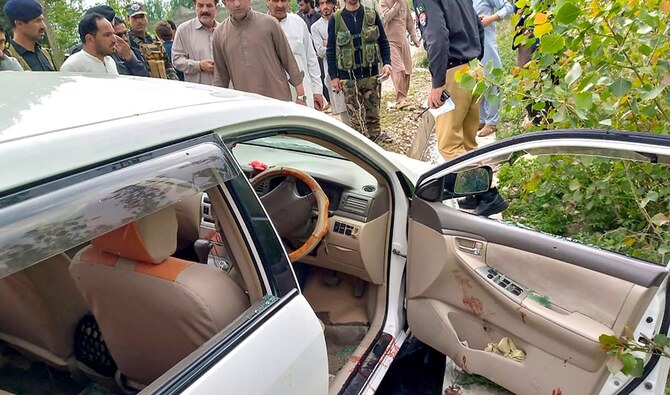KARACHI: On a Sunday morning earlier this month, twelve-year-old Huzaifa Khan walked through the narrow alleys of Karachi’s Frontier Colony, a portable microphone in his hand as his father pushed a wooden cart laden with fish.
The duo had just brought the catch fresh from the port city’s bustling seafood market and were now on their way to sell it in neighborhood markets and also make home deliveries.
Along the way, as the father-son make their daily journey, Khan records conversations between them, talking about their lives as fishmongers and small businessmen trying to seek a living on Karachi’s mean streets. The videos, which Khan began posting in February last year, have made him an instant Internet hit. Vlogs uploaded to the ‘Khanvlogs240’ Instagram page have thousands and sometimes millions of views, with the comments full of people praising him and his father for working to make an honest living.
Innocent questions from the bespectacled Khan, and a speech impediment that causes a minor stutter, has endeared him to a sizable online audience, which has in turn been a boon for fish sales.
“Earlier, my father used to buy fish from here [fish market] and sell it on a cart only but since online orders started coming in, we now also take fish and deliver it to people’s homes,” Khan told Arab News.
“People call and ask us to bring some specific fish, so we provide them with the fish they want.”
Selling fish isn’t an easy task, especially when one is also a student and a vlogger.
Khan says he wakes up every day at the crack of dawn, offers his prayers, attends school and then joins his father in the afternoon to sell fish. On the weekends, when there’s no school, he accompanies his father and elder brother Talha Ubaid on early morning runs to the fish market 14 kilometers away from their home to make purchases.
In the evenings, he also helps his father and brother run a cart selling French fries.
“I WILL BECOME AN ENGINEER”
Khan’s journey to social media success began in October 2023 after the family arrived in the southern port city of Karachi from a remote village in the northwestern city of Swat. His first video, called “Chhoti Si Dukan,” or small shop, was posted in February 2024.
Since then, he has posted hundreds of videos on different social media platforms.
“Now that I’m making videos, I feel good,” the boy said, as he shushed flies away from the fish on top of his father’s cart.
In the evenings, fans arrive to meet him at the fries stall and Khan rarely disappoints them.
“When my fans come and take selfies with me, I feel very good,” he said with a smile.
But despite his newfound online fame, the young fishmonger said education was his priority.
“I help my father and also study,” he said. “I will go to school and become an engineer.”
His father, Nadir Khan, who has two other children, said he always pushed Khan to never neglect his education.
“First of all, there are studies. Studies first and hard work later,” he told Arab News, expressing his gratitude for the recognition his son had received.
“I am very happy that God has given him so much respect. He comes on screens all over the world,” Nadir said. “When he makes videos with me and conducts my interview, I feel very good.”
Khan hopes to pay it back someday.
“When I grow up, I won’t let my father work, I’ll only give him rest,” he said.
“I will earn money and give it to him and ask him and my mother to sit back and relax.”
















